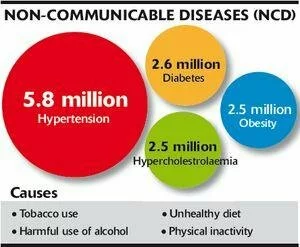A non-communicable disease is a disease that cannot spread to any other person in a community from a person who has it; it remains with the person who has it.
Heredity can play a role in a person acquiring a non-communicable but it remains within the family.
Tobacco use
Smokers die about 10 years earlier than never-smokers, they have twice the risk of heart disease, 10 times the risk of lung cancer, several times the risk of cancer of the mouth, throat, oesophagus, pancreas, cervix, kidney and bladder.
The following health problems also occur more in smokers:-stroke, peptic ulcers, fractures and cataract.
Nicotine, one of the major constituents of cigarette smoke is highly addictive and produces withdrawal symptoms if discontinued. This is what makes it difficult for smokers to quit.
Alcohol consumption
While alcohol may have some benefits when taken in moderation, the risks of alcohol abuse are numerous. Virtually every organ of the body can be affected by excessive alcoholic intake with many deaths resulting from accidents, respiratory failure and breathing in of vomit.
Alcoholism causes a lot of embarrassment to the immediate family due to violent behaviour which follows alcohol abuse and loss of consciousness in most embarrassing locations.
The problems of excessive alcohol consumption include Accidents/Violence, Cirrhosis of the Liver, Cancer of the liver, throat, mouth, stomach, intestines and breast, Heart Disease/High Blood Pressure/Stroke, Obesity, Impotence and Reduction of Body Resistance.
Alcohol damages the heart muscles which can lead to heart failure. It also raises blood pressure, disorganizes heart beat and can cause stroke.
Raised blood pressure
Untreated raised blood pressure can lead to heart disease, heart failure, kidney failure or/and stroke.
High cholesterol
High cholesterol levels due largely to improper diet can lead to heart and blood vessel diseases. Unmanaged, heart attack, stroke and other conditions can result.
Fatness
Obesity is associated with diabetes mellitus. Obesity increases resistance of body cells to the agent (insulin) which controls blood sugar. This situation eventually leads to high blood sugar- a condition known as diabetes. Obesity is also associated with heart and blood vessel diseases, also diseases of the joints.
Physical inactivity
Physical inactivity has been associated with high blood pressure, heart disease, blood vessel disease, cancers, fatness, stress and joint diseases. These are all non-communicable diseases.
Environment
Your environment is in three parts:- physical (air, soil and water), biological (plant and animals including the disease carrying germs) and social.
Air pollution is involved in several non-communicable diseases like cancers and lung diseases.
Occupation also plays a big role in non-communicable diseases such as cancer of the bladder, cancer of the lungs and some cases of poisoning.
Life Style
Life style refers to alcohol intake, cigarette smoking, physical exercise, diet, vacations, number of hours of sleep, bedtime, socialization etc.




No Comments